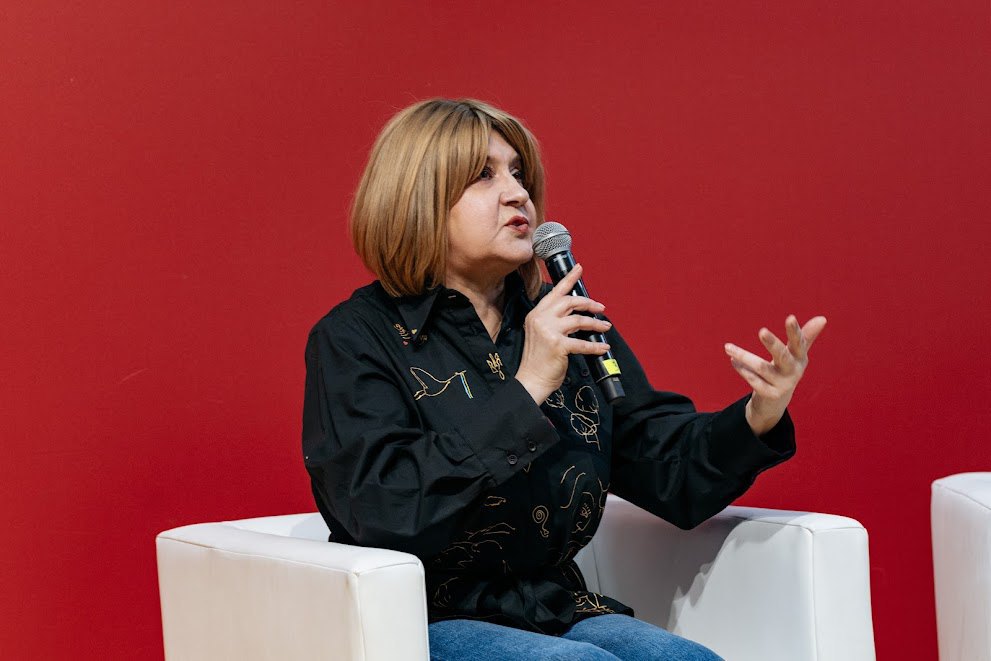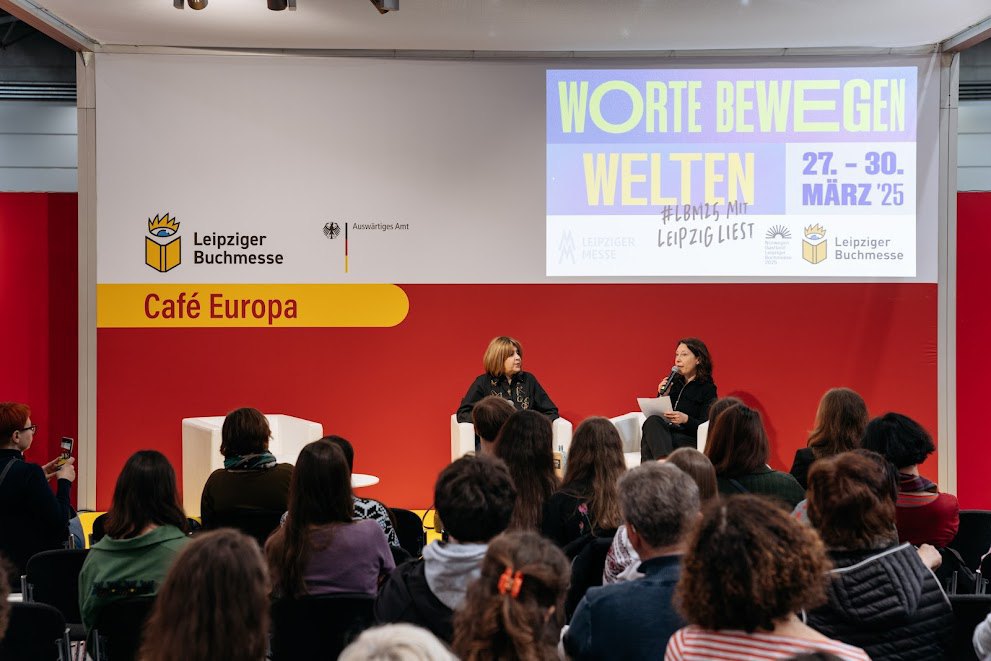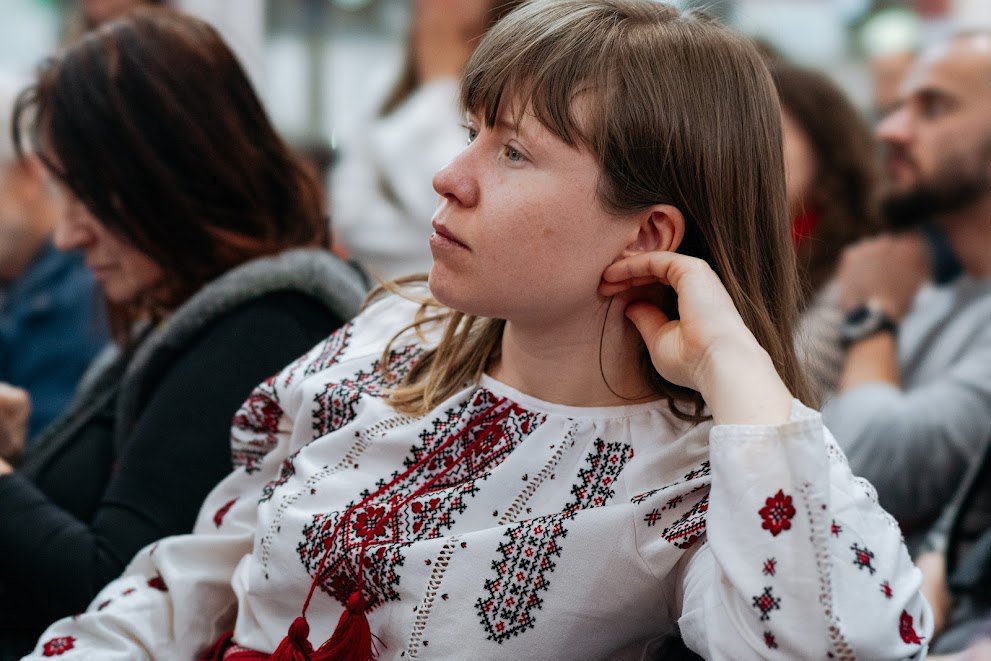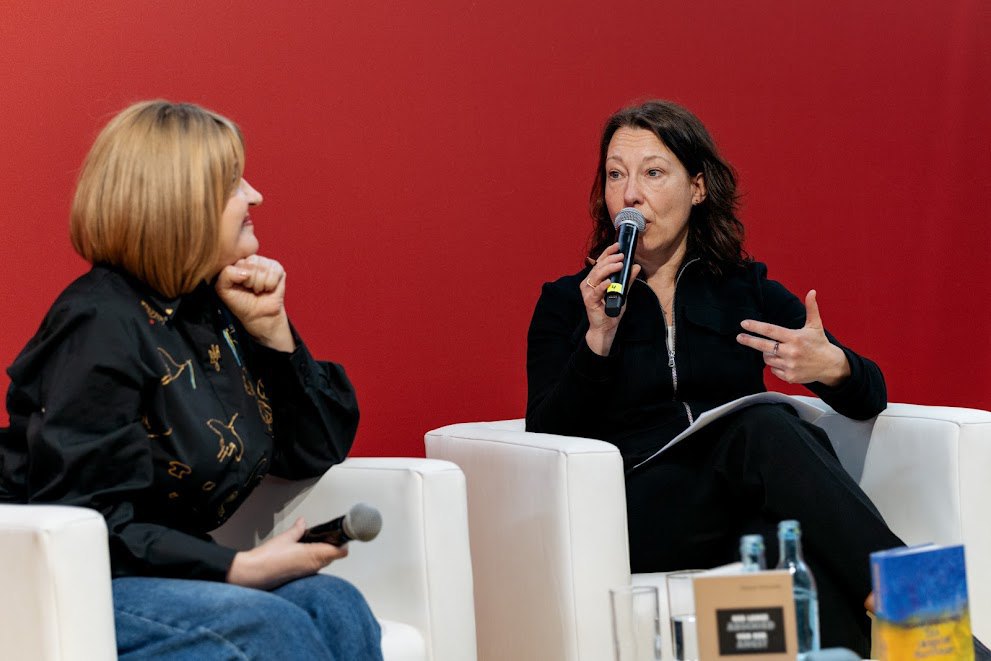
The Longest Journey is about the frontline
I often think of this book of mine in military terms, like conscription or military duty.
Before the full-scale invasion, I was working on a novel. My work on this opus magnum, which I had been cherishing for years, was rudely interrupted by Mr Putin. About a year later, I reread the manuscript and did not recognise it. The text read like someone else's work, not mine. It was like something from a previous life. It was a good text, I liked it - and the more painful is the reading experience when you are sincerely involved. Oh, it's interesting, oh, it's developing well here. And then there's a break. Three pages of notes: keywords, instructions for plot development, and so on...
Meanwhile, The Longest Journey has already been translated into 10 languages. And it's the first book in my entire career that was commissioned by a publisher.
A week or so after the full-scale invasion, an Italian publisher called my agent and asked if Ms Zabuzhko could write a pamphlet of some sort, 100 pages or so, explaining what we, the Italian readers, had not understood about the war in terms of historical and cultural contexts. My first reaction was: ‘No way.’ Because it is impossible to explain it in a hundred pages. But eventually I realised that I had to. It was my duty, since I was stuck here in the EU, far away from my country.
When I wrote ‘...the longest journey’, the battle for Kyiv was still going on. It felt like, you know, my own cry to the universe. Now the war is ongoing, and the cry still hangs in the air and still resonates. There's still that other side that doesn't hear it, as we saw in the unforgettable dialogue between Zelenskyy and Donald Trump and J.D. Vance in the Oval Office.
The updated German edition, with a preface and appendices, explains this; and yes, it is part of what I can do as a writer for my country. Countries are in a war of destruction.
It is, so to speak, my military duty.

The Third World War that the West is so afraid of
Fear of the Third World War is quite normal for all reasonable and sane people. But this does not mean that there is no need to prepare or to normalise the unwillingness to acknowledge it. No world war begins with the ‘first shot fired in Sarajevo’. Before that particular shot, the Balkan wars had been going on for two years, which are considered local and not included in history books as part of the First World War.
Thus, every world war occurs as a result of systemic mistakes and crossing the red line, when it is no longer possible, so to speak, to put the toothpaste back in the tube. The situation of writers and intellectuals, of all the Cassandras of all times, is to see the toothpaste being squeezed out of the tube, while the rest of the world does not notice. The experience of the current war shows the obviousness of the predictions, and the logic of the development of events both in the 1930s and before 1914, and also that we are following the trodden paths of deceived or seduced predecessors.
Yes, this is a great drama that is really interesting to watch and will be even more interesting to read about in 30-40 years, when everything is resolved and becomes a thing of the past. But it is not very pleasant to live through it. We live in a time of great historical change. And we have to fasten our seat belts. I say this all the time.

After 1989: why we have learnt nothing from history
There are very good scholars in Germany who have done very, very good research on the Second World War. This is true. But in these three years, I've been thinking about how much of this has become common knowledge.
Two years ago, a German historian, the author of a book about fascism, who spent some time among neo-Nazis for his work, said that young people, especially in East Germany, do not really understand what it is. They know about Hitler. They know about the Holocaust. But they cannot describe fascism. This means that they are unable to recognise its disguised versions.
So I don't think the lessons of the past have been learnt. Not to mention the widespread sincere belief of Europeans after 1989 that there would be no more wars. Back then, Fukuyama proclaimed the end of history. And back in 2014, Yuval Harari wrote that in the twenty-first century, there are more chances of dying of boredom than in war. Now we can say that we are not in danger of dying of boredom. But it is still an extremely dangerous mistake of intellectuals: to believe that wars arise as misunderstandings, instead of recognising them as the result of preventable systemic errors.
Ukraine On Fire: mass propaganda for war
Since we are at a book fair, let's start with literature. Somewhere around 2007-2008, the Russian book market switched to mass war propaganda. In a certain sense, it is very inventive. For example, a special genre is historical fantasy with the Accidental travel technique. The hero, our contemporary, wakes up in the body of, say, Hitler or another historical character in order to correct the past.
By the way, another Western misconception about Russia is that it is an anti-Nazi country. Russia's trauma towards Germany is Hitler's betrayal of Stalin, who broke the 1939 Molotov-Ribbentrop Pact and attacked the Soviet Union instead of jointly attacking the West.

While Western Russologists defended their theses on really good writers published in Russia in 3000 copies without any impact on the local society, at the same time with titles like Ukraine is Burning, Donbas on Fire, hundreds of titles and, without exaggeration, millions of copies of fiction about Russia's mission, rewriting history, revanchism, rehabilitation of Stalinism, full of hatred for the West, for Ukraine, and so on, were printed and distributed. All these scenarios could be read in that garbage long before 2014. Mostly in the rubbish, because it was not addressed only to the uneducated public.
Donbas on fire, everything on fire, Kyiv in three days - all of this came from the mainstream, which is hardly even a genre and has never been mentioned in Western Russian studies.
When in the spring of 2022 I published my essay No guilty people in the world? Reading Russian literature after the Bucha massacre, it caused a stir among Western Slavic scholars and even seemed to offend many respected professors. At the same time, it turned out that for a long time the younger generation of scholars has been unhappy with the fact that Slavic studies has long since turned into apologetic (rather than critical) Russian studies...
Professional Russian scholars should have obviously monitored the brewing propaganda long before the outbreak of the war in 2014 and warned their audiences of the threat. This is what they were trained and paid to do. However, they simply did not do their job.
This is just one more piece of evidence that 24 February 2022 did not happen out of the blue: the war had been in the making since 2004, when civil society reacted with the Orange Revolution to an attempted election fraud. Euromaidan ended with the occupation of Crimea and the so-called Russian Spring, an attempt to split Ukraine. The 2022 blitzkrieg is a third attempt and an act of pure desperation.
All of this was missed by Western optics - while Putin has never hidden his intentions.

Trump-Putinism
In our era of new totalitarianism, the term ‘Trump-Putinism’ has already emerged; in Ukraine, it is used very actively. Because these two understand each other perfectly. Superpower, this is the thinking of grown men.
Okay, three big boys: Putin, Trump, and Xi Jinping - divide the world into spheres of influence based on the Yalta Treaty model. However much they may like it, this approach is outdated. The Ukrainian resistance is the best proof that the world cannot develop according to Orwell's 1984.
It is about colonising not only Ukraine, but also Europe, which, according to their earlier scheme, belonged to the Russian sphere of influence. Yeltsin told Clinton to give away Europe, and he did so not drunkenly, but sincerely. Trump started with Canada and Greenland.
From the perspective of the twentieth century, this looks and sounds scary. But today it is largely a bluff. It's an information war, an attack on people's minds to frighten and dominate. I don't want to sound like an ageist, but this all reminds me of my youth in the days of Soviet gerontological socialism. Brezhnev died at 75, three years younger than Trump is today.
The idea of Europe
In his famous essay The Tragedy of Central Europe, Milan Kundera wrote about Europeanness and what makes certain countries Europe and not Russia. The European Union has managed to preserve this diversity of agora. Now it is time to build city walls around the place of dialogue. Having lost the American umbrella, which has been taken for granted since 1945, politicians are decisively discussing a new system of collective security.
Ukraine, with the strongest, best army on the continent and the experience of a three-year war in the 21st century, fits into this defence belt. Look at the most recent polls: most Ukrainians will never surrender, no matter what Trump or Putin thinks.

Crisis of imagination and sense of history
In the three years since I wrote The Longest Journey, history has accelerated so much that it is now becoming easier and easier to talk about it all. I have what T.S. Eliot called a historical sense, a sense of history. Writers may be less knowledgeable than sociologists or political scientists, but their voices are no less important in crucial times.
When this book had just been published, I was interviewed at the Frankfurt Book Fair by a journalist who is a literary critic by profession. He was interested in the course and outcome of this war, and I was thinking in terms of the end of empires, from the perspective of the exhaustion of a 300-year historical plot. So when asked when this war would end, I replied that I was not, after all, a military expert. The journalist said that I was, however, an expert on imagination. It was like an epiphany for me. Because that is the problem. The reason for all crises, the global crisis of history, is the crisis of imagination of decision-makers. A crisis of imagination among politicians in the Pentagon, the White House, and the Kremlin.
Back in February 2022, when I was travelling to Warsaw for the presentation of the Polish edition of my book, I was sure that there would be no full-scale invasion. Because the day before, I had spoken to a Ukrainian official who said that a 200,000-strong army could not conquer a country of 40 million. From the point of view of military science, six times as many soldiers are needed.
Why was Putin so wrong? It was a crisis of imagination! He did not assume that there was a people on this territory who could have their own opinion. Because the Russian population accepts any government that enters their territory - they say, we are small people, what can we do? And Ukrainian civil society resists and has its own voice. The failure happened precisely because of the people's resistance - and he simply could not imagine it.
We are very self-sufficient, and this is an optimistic example for societies that are disappointed in their existing or dysfunctional democratic institutions. This is Europe, the ancient Agora. We can call it the Maydan. It is a horizontal level of self-organisation of society, and we are proof that it works.
The material was prepared with the support of the Goethe-Institut in Ukraine. Event organisers: Goethe-Institut in Ukraine and the Ukrainian Institute.








